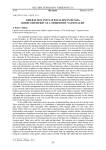Вестник Пермского университета. История @histvestnik
Статьи журнала - Вестник Пермского университета. История
Все статьи: 1123
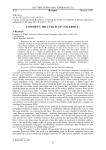
Comment: the utility of "celebrity"
Статья научная
Replying to the two contributions in this special issue, this commentary considers the work “celebrity” can do as a concept and topic of inquiry for historians of Russia. The author compares and contrasts “celebrity” (as an angle of vision) with investigations the formation of “public” and “private” life in 19th century Russia. He underlines two uses of the concept: 1) as a reminder of continuities and instabilities that link modern forms of fame with pre-modern systems of reputation; and 2) as a marker of global forces that were pushing beyond nationalized, institutionalized frames of public and private life. The author returns to some earlier work he has done on Russian intellectual history, to consider how discussions of “celebrity” reframe what an older literature might describe as the “making of intelligentsia traditions.” He also highlights several important conceptual contributions made by Konstantin Shneyder’s historiographical analysis, and considers what conclusions can be drawn from Matthew Klopfenstein’s reconstruction of the “operatic” death of Angiolina Bosio.
Бесплатно
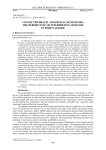
Connected brazil and digital humanities: the perspective of interpreting museums in Porto Alegre
Статья научная
A connected society implies a new concept of cultural patrimony which starts to exist when the space is changing from physical to the one of data flow. Cyberspace and new technologies in cultural institutions provide up-to-date information to their public that has the potential of acting as a co-author by creating and sharing. Accessing cultural information of the museum's collection online through the screen or electronic device is a global trend and leads individuals to interact, exchange knowledge and absorb social change. Can one think that it is the "Digital Age" that is imposing itself on teaching during the pandemic? Can you imagine that everyone will migrate to digital on equal terms, including the population most vulnerable to poverty? Are digital educational resources within easy reach of the entire student community? Do all families have sufficient digital literacy and financial conditions to assist and enable their children to access and use digital tools? The answers seem obvious. It is not possible to disregard or pretend to be a minor problem, which was known before the covid-19: the digital inequality. It has already been revealed that the place where you live defines insertion in the digital world. The outskirts of Porto Alegre, like many others in Brazil, are full of families with school-age children who face serious obstacles to accessing the world wide web. Difficulties ranging from not being able to buy a computer to being unable to pay the cost of equipment or connection services. That is why they are classified, in the surveys, as "second-class users", for making use of the internet based on more limited tools, such as cell phones, limited data access and access in public places. Digital inequalities connected with the pandemic. The article analyzes the connected Brazilian society and characterizes its involvement in the social media using the example of the museums of the city of Porto Alegre.
Бесплатно
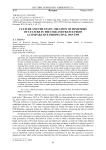
Статья научная
In this essay, the creation and organisational frameworks of the ministries of culture in the USSR and France are compared. Established in the 1950s, they represent an important departure from most then-contemporary European practices, on the one hand reflecting the acceptance of a particular role of the state in cultural governance, yet on the other lacking a clearly defined area of competence, policy strategy, and power resources. In France, the creation of a separate ministry of culture resulted in no small part from a desire to give a ministerial rank to Andre Malraux and make a reverence to French culture as part of national identity. Conversely, the Soviet regime sought to assert culture's symbolic independence from propaganda, while equally upgrading the status of culture within the state apparatus. In both cases, the ministry of culture was politically weak, and in the Soviet Union an appointment to a minister of culture was akin to a demotion compared to top party positions. Malraux found himself without a detailed plan and significant economic and personnel resources, just as the Soviet ministry was relatively underfunded and subordinated to the CPSU Central Committee's cultural department. While the Soviet and French decisions to raise cultural management to a ministerial level occurred independently from each other, they reveal deep-seated parallels in the respective societies' perceptions of culture, governance, and the value of cultural goods and habitus that prevailed over a clearly defined policy of cultural management.
Бесплатно
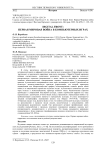
Digital front: Первая мировая война в компьютерных играх
Статья научная
В статье представлен краткий обзор современных дискуссий о трансформации исторической памяти в цифровой культуре, прежде всего в видеоиграх. Репрезентация в играх трагического и героического нарративов, чаще всего связанных с Первой и Второй мировыми войнами соответственно, существенно различается. Героический нарратив использует реалистическую стратегию репрезентации и делает акцент на визуальную детализацию, линейное сюжетопостроение, синхронизацию игрового, вымышленного и исторического времени. Аутентичность воспринимается здесь через достоверность деталей. Трагический же использует деконструктивистскую стратегию репрезентации, для которой характерны анимационная или импрессионистская графика, позиционирование главным врагом самой войны, а не национальных армий или отдельных солдат. Аутентичность понимается при этом через отсылку к экзистенциальному характеру военного опыта. Реалистическая стратегия преобладает в современной популярной культуре, однако героический нарратив все чаще переплетается с трагическим. В итоге баланс между стремлением к нормализации войны и ее проблематизации существенно меняется в пространстве культуры. В статье анализируется западная историография, посвященная анализу игр «Верден 1914-1918», «Траншеи», «Отважные сердца» и др. Делается вывод о том, что влияние дигитальной культуры и видеоигр на представления о прошлом нельзя сводить исключительно к консьюмеризму либо популяризации академических знаний. Оно предполагает активное преобразование самих способов взаимодействия с прошлым, изменение сложившихся жанровых канонов, рост интерактивности, демократичности и эстетизации. Эти тренды оказываются неразрывно взаимосвязаны с более широкими трансформациями режимов историчности в общественном сознании рубежа XX-XXI вв.
Бесплатно
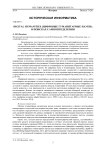
Digital humanities (цифровые гуманитарные науки): в поисках самоопределения
Статья научная
Рассматривается этап становления в мировой науке важного историографического направления - digital humanities (цифровые гуманитарные науки). Особое внимание уделяется вопросам определения границ и междисциплинарных связей направления, установления методологических принципов и создания самоорганизующегося международного сообщества. Критически рассмотрена новейшая литература, сделан прогноз развития данного направления.
Бесплатно
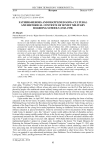
Статья научная
The article explores the history and ideological implications behind the creation of the Suvorov and Nakhimov military boarding schools. The author argues that these educational institutions had several important functions within the Soviet society of the 1940s. The institutions promoted the model of educating new cadres of military elite, while employing, as their main pedagogical approach, a tricky combination of harsh discipline and demands of limited inventiveness and initiative. Another important task the schools were charged with was the provision of secure space (which included clothing and nutrition) for those boys whose fathers were either killed or still at the battle grounds of WWII. The formation of symbolically meaningful skills, such as ball dancing or horse-back riding, was essential for this new military elite generation, since such abilities meant to create self-identification and, most importantly, external perception in connecting these Soviet era cadets with the traditions of pre-revolutionary nobility upbringing. The young generation of future warriors was perceived as happy, well-trained, and loyal symbolic substitutes for their predecessors who perished during the Great Terror and the WWII. The author argues that all mentioned features have persisted till nowadays, and contemporary parents eagerly send children to study at military schools (and, correspondingly, to leave the family) in order to increase their -competitiveness‖ for the future life.
Бесплатно
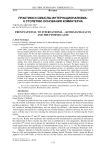
From national to international - Konrad Zilliacus and the Finnish cause
Статья научная
In October 1904, while the Russian Empire fought against Japan in the Russo-Japanese war (1904-1905), representatives of the Russian revolutionary parties and national minorities of the Russian Empire gathered in Paris. Their aim was to build a common strategy for overthrowing the Tsarist regime. For this, the Paris Conference tried to unite the opposition forces from right to left. A Finnish journalist, writer and political activist, Konrad (Konni) Zilliacus (1855-1924) played an important role in organising this international event. Zilliacus’s attempts to unite the opposition forces of the Tsarist regime, as well as his cooperation with the Japanese military attaché Motojiro Akashi, have been discussed in several studies, especially in Finland. However, Zilliacus’s thoughts on nationalism and international cooperation are less discussed. The paper analyses the concepts of nationalism and internationalism in the context of Swedish-speaking elite in Finland, as well as in Konrad Zilliacus’s writings and political activism. As a journalist, writer and political activist, Zilliacus represented the younger generation of the Finnish elite, which did not accept the Tsarist regime’s unification attempts. The first Russification period (1899-1905) radicalised Konrad Zilliacus, who decided to seek support from the Russian revolutionaries. He believed that the Russo-Japanese war would lead to a revolutionary upheaval in the Empire, and this would help Finland in its struggle for autonomy. Zilliacus creates an interesting case in the discussion of national and political radicalism. Analysing his writings in the newspapers and his memoirs, the paper investigates what kind of nationalist and internationalist Konrad Zilliacus was.
Бесплатно
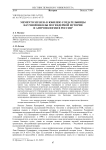
Memento mulier: к юбилею создательницы научной школы по гендерной истории и антропологии в России
Статья научная
Рассматривается роль доктора исторических наук, профессора Натальи Львовны Пушкаревой в становлении и развитии в СССР и России нового для отечественной гуманитаристики научного направления - гендерной истории и антропологии. Н.Л. Пушкарева отмечает в 2019 г. двойной юбилей - 60-летие со дня рождения и 30-летие с начала пути в большой науке, связанное с изданием ее первой монографии «Женщины Древней Руси». Показаны этапы профессионального становления Н.Л. Пушкаревой, ее важнейшие научные достижения в области гендерных исследований, раскрываются особенности познавательных практик ученого. Н.Л. Пушкарева создала научную школу в области гендерной истории, возглавив сектор этногендерных исследований в Института этнологии и антропологии РАН, активно внедряла новые междисциплинарные методологические подходы, популяризировала женскую и гендерную историю, выступая с лекциями в ведущих университетах России и зарубежья, активно сотрудничая со СМИ. Уделено внимание деятельности некоммерческой организации, объединяющей преподавателей и научных работников, - Российской ассоциации исследователей женской истории (РАИЖИ), инициатором создания и руководителем которой многие годы является Н.Л. Пушкарева. Оценивается ее личный вклад в увеличение эвристического потенциала исторических исследований, касающегося анализа и сопоставления системы гендерных отношений в прошлом и настоящем. Отмечен международный резонанс научной деятельности Н.Л. Пушкаревой, труды которой издавались и переиздавались в России и за рубежом, получили множество положительных иностранных рецензий и были отмечены престижными профессиональными наградами, что, бесспорно, свидетельствует о международном признании ее научных заслуг.
Бесплатно
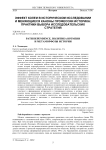
Path dependence, политика времени и метаморфозы истории
Статья научная
Резюме: Path dependence, используемая в социальных науках для моделирования динамики разнообразных явлений, дает возможность поразмышлять о том, как устроено знание о прошлом. Этос истории и ее роль в жизни людей в новом тысячелетии занимает большое место в трансдисциплинарных исследовательских программах и дискуссиях, в которых участвуют не только историки, но и философы и представители всех наук без исключения. В этих далеких от завершения дебатах важное место принадлежит историографии, на основе которой переопределяются ключевые концепты познания: время, причинность, рациональность, истина, объективность и пр. Речь идет о переосмыслении концептуальных оснований исторического познания и становлении новой исторической культуры. В статье обсуждаются современные дискуссионные тренды в эпистемологии историографии, связанные с проблематикой исторической динамики. Анализ авангардных тенденций в интеллектуальной культуре позволяет показать, каким образом происходят изменения в понимании и производстве исторического. В условиях стремительно меняющегося мира и радикального обновления темпорального опыта открытие политики времени, переосмысление историчности, поиск качественного времени истории вносят важные нюансы в понимание специфики современного исторического исследования, рождающегося на пересечении теории и практики. В культуре утверждается мысль о перформативной роли истории и историков в нашей современности. Историки не просто изучают прошлое, они участвуют в формировании историчности и темпорального режима, в котором живут, помогая людям анализировать жизненные ситуации, принимать решения, формировать правила коммуникации и создавать «институты» как базовые культурные структуры, определяющие жизнь в настоящем и позволяющие находить в ней ресурсы для размышлений о будущем.
Бесплатно
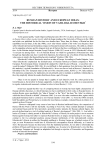
Russian history and European ideas: the historical vision of Vasilii Kliuchevskii
Статья научная
To the general public, Vasilii Osipovich Kliuchevskii (1841-1911) is above all known for his Course in Russian History (Kurs russkoi istorii), which he began reading at the University of Moscow in the 1880s and which was published for the first time two decades later. 1 Since then, his history of Russia has been republished several times; in the late 1980s, a new nine-volume edition of his works even became a bestseller. Kliuchevskii has had tremendous impact on Russian historical self-awareness. His skills as a historian, his appealing schemes and his eloquent style are all factors that have contributed to his canonical position. As the Russian emigre historian Georgii Fedotov (1886-1951) wrote in 1932, Kliuchevskii''s history "is not just one among many - it is the Russian History on which two generations of Russians have been brought up. Specialists may have voiced their objections, but whenever any of us think of historical Russia, what comes to mind is the Russia Kliuchevskii visualized" (Fedotov 1986: 204). Kliuchevskii''s idea of Russia also involves an idea of Europe. According to Charles Halperin, "even when Kliuchevskii emphasized the distinctiveness of Russian historical evolution compared to West-European, West-European history remained the standard by which the past of Russia - or anywhere else -would be judged" (Halperin 2000: 404). It is not difficult to find quotations from his history that testify to this tendency; a typical formulation of Kliuchevskii is "let us now have a look at Moscow''s location in relationship to the other European states [at the end of the sixteenth century, KJM]" (2: 397, italics added). 2 His numerous comparisons, by implication, do not primarily aim to maintain an antithetic relationship; rather, they implicitly inform the readers that Russia forms a part of Europe.
Бесплатно
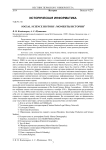
Social science history: моменты истории
Статья научная
Представлено одно из относительно новых направлений современной отечественной исторической науки - Social Science History. Дается характеристика указанного направления в сравнении с зарубежными тенденциями его развития. Рассматривается история становления и развития Social Science History в зарубежной науке. Анализируются различные точки зрения на содержание и определение термина Social Science History на разных этапах развития рассматриваемого направления.
Бесплатно
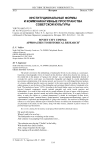
Soviet city cinema: approaches to historical research
Статья научная
The article is devoted to the methodology of studying the Soviet era city cinema as a social space. It presents a historiographic review of research in this direction, which shows that the city cinema, as the central link in the practice of “going to the cinema”, was an important independent element of everyday life, and its social space was historically changeable and shaped by several stakeholders (government, administration of the cinema network, and viewers). For a full-fledged historical analysis of a cinema, additional specific sources are required. As the main concept for studying the cinema, the authors propose to use the theory of the philosopher and sociologist Henri Lefebvre, formulated in his book "The production of space" (1974). According to the French thinker, space in a broad sense can be physical (material component), mental (rational principle) and social (social practices and relationships). As a result of their social activity, people influence all types of spaces, with the process of production of space, physical, mental, and social, taking place within society. If we apply Lefebvre's theory to study the cinema as a cultural phenomenon, it should be investigated at three levels: “representation of space” (material forms), “spatial practices” (management and functioning), “space of representation” (experience and interpretation of “going to the cinema"). For each level of studying the cinema as a social space, different types of historical sources are utilized, the characteristics of which are presented in the article. In this context, along with other sources, attention is paid to sources of personal origin (ego-documents).
Бесплатно
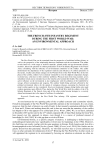
The French 47th infantry regiment during the First World War: an environmental approach
Статья научная
The First World War can be examined from the perspective of traditional military history as well as the perspective of the relationship between combatants and the environment. The author reveals based on a wide range of archival materials, printed media and ego-documents (diaries, memoirs, letters) the question of combat peculiarities of the 47th Infantry Regiment of the French Army considering with the influence of environmental conditions on the soldiers. The author demonstrates the dependence of the regiment's intensity and efficiency of combat operations on the terrain, weather and climate changes on the Western Front of the First World War. In the first phase of the conflict, soldiers were extremely vulnerable to even the slightest temperature changes (extreme heat, cold) due to their uniforms' problems. Physical strain from long marches across unfamiliar terrain and an extended stay in the trenches also harmed their health. The combat unit's active influence on the environment is also emphasised, with the pollution of the battlefield by sewage, leftover ammunition and weapons. The soldiers' health being adversely affected by the polluted environment (above all, the spread of contagious diseases, poisoning by chemical and metal warfare agents) is also considered. Severe environmental changes during battles also made combat operations more difficult. Thus, during the First World War, both the soldiers of the 47th Infantry Regiment of the French Army and all the other poilus became hostages to a severely altered environment due to the impact of millions of combatants.
Бесплатно
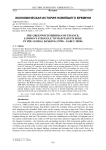
Статья научная
The article analyzes the development of London as a world and national banking centre over the past 50 years, from the early 1970s to the present. The study is based on large arrays of historical statistics, systematized and processed by the author. London was the largest banking centre in the world in the 19th and early 20th centuries, but it gradually lost its position thereafter; by 1970, it was at third place in the global hierarchy. New factors that emerged in the 1970s (for example, the crisis of the Bretton Woods monetary system) contributed to the further decline of London. At the next historical stage, the situation changed radically as a result of the deregulation of the national financial system, implemented by the Conservative governments of Thatcher and Major (1979-1997) and then Blair's New Labour (1997-2007). Taking advantage of new business freedoms, British banks significantly expanded the scope and directions of their activities. In 2008, London ranked second in the world in terms of banking assets. However, this was largely the result of overproducing risky financial instruments. The British banking system suffered a severe downturn during the Great Recession of 2008-2009. Nevertheless, the main problems were then concentrated not in London, where banks remained relatively stable, but in Edinburgh. Later, London-based corporations led the recovery of the national banking system. London, which has long lost its absolute leadership, still remains a very important financial hub and is undoubtedly one of the five or six largest banking centres in the world.
Бесплатно
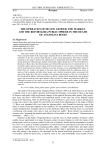
Статья научная
This article analyzes the development of a gendered culture of celebrity in nineteenth century Russia using the death of the opera singer Angiolina Bosio in 1859. Bosio was one of the leading celebrities of her era, and her death became a major social phenomenon. The article examines reactions to the singer’s death in the capital press to demonstrate that the figure of the celebrity female performer reflected major changes in the public sphere during the era of the Great Reforms. Reactions to Bosio show that female opera stars reflected the growing role of commercial forces in the public sphere and the anxiety about them from the point of view of many commentators. This article demonstrates that female celebrities reveal the dynamics of an expanding public sphere in Russia that was visible in the pages of the press. Bosio embodied both the ambiguous status of opera as both a popular and elite artistic genre, and a distinct emotional culture associated with opera. Her death shows the role of gender in the creation and dynamics of the role of celebrity in the textual public sphere. Analyzing reactions to Bosio’s death clearly demonstrates that gendered tropes and conventions from opera spread widely beyond the theater and influenced public life. Through the prism of her death, we can see the development of a public sphere in the which cultural boundaries blurred and European-wide operatic conventions became a model for public behavior.
Бесплатно
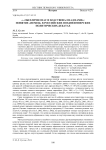
Статья научная
В рамках «концептуальной истории» рассматривается понятие «немец» как одно из ключевых в политических дебатах позднеимперского периода в истории России. Это позволяло поднимать вопросы, центральные для интеллектуальной истории России: признание со стороны «значимого Другого» и аутентичность собственной культуры. Аргументируется то, что понятие «немец» конденсировало травматический опыт «непризнания» и, как следствие, позволяло запустить целый ряд реконцептуализаций «немца» - «ложный европеец», «псевдоморф» и в военный период «варвар». В качестве источников использовались преимущественно журналы по религиозно -общественным вопросам, выходившие в начале Первой мировой войны
Бесплатно
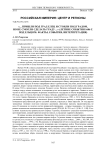
Статья научная
Исследуется участие елецкого гарнизона в волнениях Смутного времени в Московском государстве начала XVII в. Для всестороннего рассмотрения темы был проведен анализ историографии вопроса, а также определен круг сохранившихся документов. Имеющиеся материалы позволили не только восстановить ход событий и установить роль Ельца в геополитической игре на южных границах, но и выделить факторы, повлиявшие на переход инициативы от правительства к восставшему городу.
Бесплатно
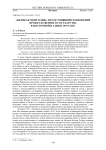
Статья научная
Исследуется один из эпизодов национально-освободительной борьбы за независимость Монголии в 1911 - 1921 гг. Рассматриваются основные эпизоды внутренней борьбы в панмон-гольском движении, а также место и значение националистических движений и казачьего сепаратизма в новом курсе политики Токио на Дальнем Востоке. Предпринимается попытка раскрыть причины резкого изменения внешней политики Японии в конце Первой мировой войны в сторону построения марионеточных государств на территории России и Китая.
Бесплатно
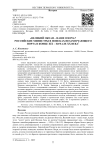
Статья научная
Статья представляет результаты исследования дальневосточной политики Российской империи конца XIX – начала XX в. на примере поиска незамерзающего порта на Тихом океане. В работе рассмотрены позиции министерств, задействованных в принятии решений такого рода, выявлены соотношения и взаимозависимость между развернувшейся дискуссией и существовавшей иерархией министерств, практиками коммуникации между учреждениями и меняющейся международной конъюнктурой. Автор приходит к выводу о том, что министерская борьба 1895–1898 гг. по вопросу о создании незамерзающего порта развернулась среди четырех административных центров: Министерства иностранных дел, Министерства финансов, морского и Военного министерств. Значимую роль в формировании дальневосточной политики сыграли такие личности, как министр финансов С. Ю. Витте, управляющий Военным ведомством А. Н. Куропаткин, министр иностранных дел М. Н. Муравьев и управляющий Морским министерством П. П. Тыртов. Заявления о необходимости развития, усиления Тихоокеанского флота и выстраивания отношений с Кореей не были услышаны теми, кто отстаивал приоритет усиленного железнодорожного строительства и аренды части Ляодунского полуострова. Несмотря на осознание важности незамерзающего порта для обеспечения военно-стратегических и экономических интересов России, министерская борьба затормозила принятие эффективных мер. В результате, вместо комплексного подхода, включавшего в себя развитие флота, укрепление связей с Кореей и строительство порта, приоритет был отдан аренде Ляодунского полуострова и строительству железной дороги, что в перспективе привело к усилению зависимости от Китая и обострению отношений с Японией.
Бесплатно

